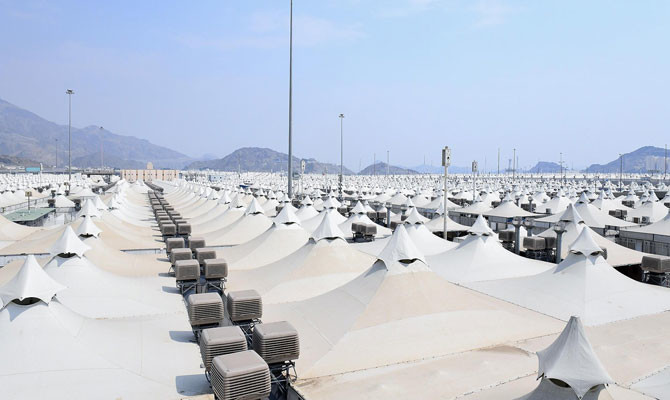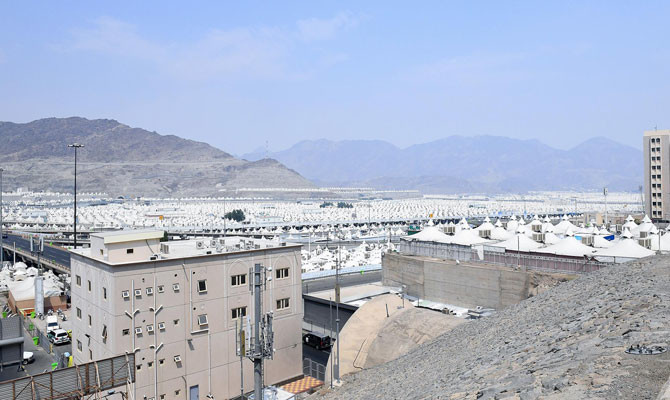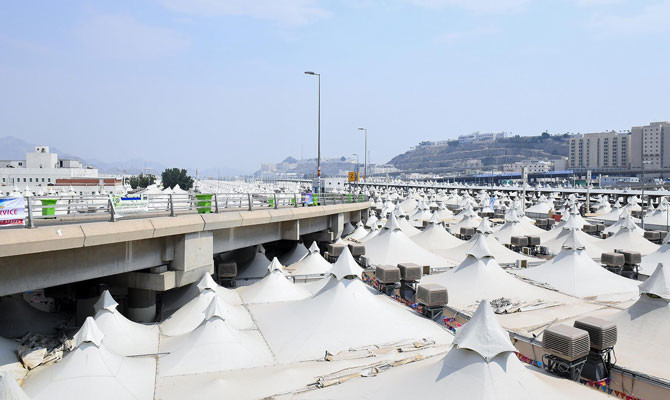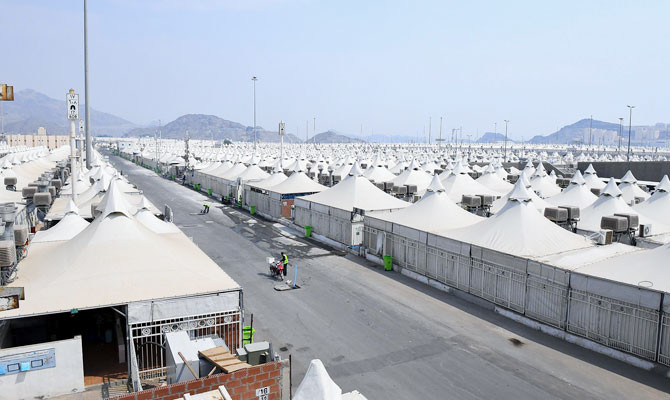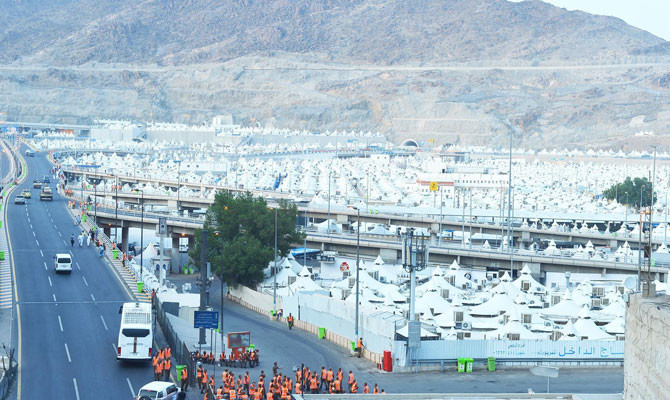JEDDAH: Around 2 million pilgrims arrived in the Holy Land from outside and inside the Kingdom in preparation to set out from Makkah for Mina.
They will retrace the noble tradition of Prophet Muhammad (peace be upon him) and spend the Tarwiyah Day on Sunday in Mina. Here they will make final preparations for the Standing (Wuquf) at Arafat, which marks the climax of the annual pilgrimage, on Monday.
To be able to serve the pilgrims and enable them to perform Hajj rituals with ease and comfort, the government and private sectors concerned with Hajj and pilgrim affairs intensify their preparations, under the direct supervision of Prince Khalid Al-Faisal, adviser to King Salman, the governor of Makkah region and chairman of the Central Hajj Committee, and followed up by his deputy, Prince Abdullah bin Bandar.
The Ministry of Health will provide intensive and continuous health services supported by skillful human cadres and state-of-the-art medical technologies, in order to provide the best health services for pilgrims. The Ministry of Health has employed a total of 29,495 physicians, pharmacists, nurses and technicians to provide extensive health care to the pilgrims.
According to the ministry, its manpower during the Hajj consists of 780 consultants in various medical specializations, 1,248 specialists; 2,718 general practitioners; 1,428 pharmacists; 3,553 nurses; 1,173 technicians and lab specialists; 198 specialists in nutrition; 5,587 administrators; 165 engineers; and 1,491 ambulance drivers.
The General Presidency of the Grand Mosque and the Prophet’s Mosque will operate and maintain all technical devices and systems of lighting, air-conditioning and ventilation, sound and control systems, cameras, communication devices and electrical stairs, buildings and libraries in the Two Holy Mosques.
Air-conditioning has been installed in the basement and ground floor and many other areas. Thousands of fans have been installed in the Two Holy Mosques and their yards.
The area around the Two Holy Mosques has been equipped with more than 8,441 toilets, as well as more than 6,000 ablution units. All power supply lines have been prepared to make sure there is power 24/7.
More than 10,000 male and female employees will be available to follow up on work and monitor it during Ramadan, in addition to a large number of cleaners.
Among the services also provided by the Presidency are translation of Friday sermons into 10 languages, organization of various scientific programs, and competitions.
A total of 210 doors in the Grand Mosque and 100 doors in the Prophet’s Mosque have been prepared, as well as 28 escalators in the Grand Mosque and four escalators in the Prophet’s Mosque. There are 38 doors for people with special needs and seven for women.
The Saudi Red Crescent deployed 127 emergency centers, 361 ambulances, 20 motorbikes, and more than 1,861 people to work in the ranges of Makkah and Madinah.
There will be 22 operational hospitals in Madinah and the holy sites, 15 temporary emergency centers, supported with more than 87 ambulances and 653 paramedics.
The Ministry of Municipal and Rural Affairs mobilized its human and mechanical capabilities to enable pilgrims to perform their duties in a safe and healthy environment by employing more than 26,000 individuals and 717 mechanisms to implement the hygiene plan in Makkah and the holy sites, as well as specialized field teams to control 33,069 food facilities in Makkah.
Civil defense teams will be deployed around the clock to deal with all emergency cases, where the injuries will be transferred using stretchers and wheelchairs to several medical evacuation sites inside and outside the mosque.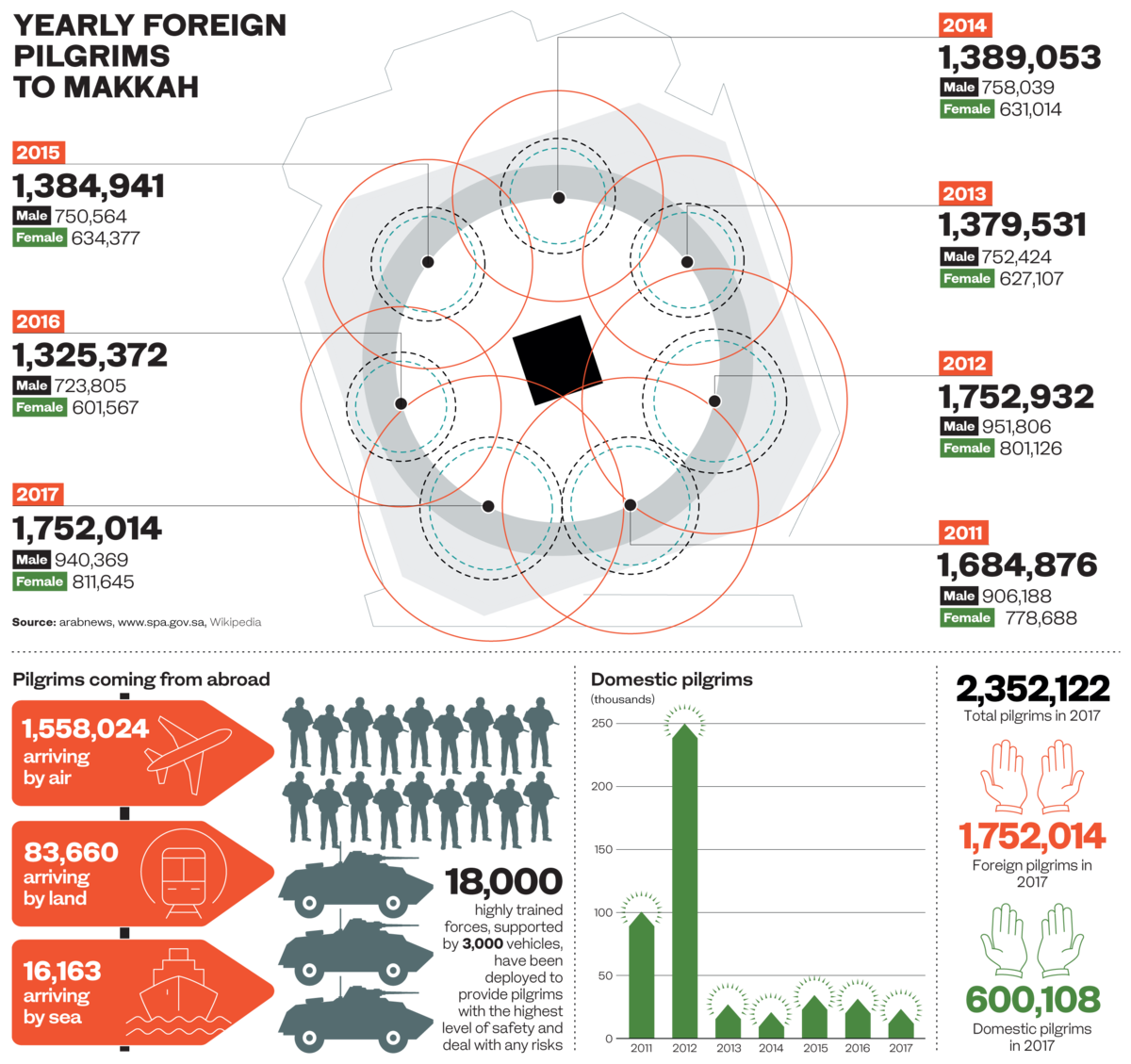
These teams will also be carrying out extraction and rescue operations inside the Holy Mosque and the surrounding area, in addition to providing urgent first aid, and transferring critical cases to the nearest hospitals and health centers, in coordination with the Red Crescent teams around the Holy Mosque. The Hajj security forces leaderships announced their readiness to maintain the security and safety of pilgrims during the pilgrimage season.
The General Command of the Air General Security is supported by all the security services and various government sectors.
In preparation for the Hajj season, the Saudi General Security Aviation Command announced that it has started implementing the first phase of its security plan to ensure the safety of pilgrims in the Kingdom. The aviation command will commence security operations over the holy sites, where special helicopters will monitor the activities surrounding the Hajj season this year. The planes are stationed in the designated locations in Makkah and Madinah from various bases to carry out the tasks assigned to them, namely traffic and security, logistical support for other security bodies, humanitarian services and the monitoring of pilgrims not following the rules.
All eyes on Mina as Hajj begins today
All eyes on Mina as Hajj begins today

Saudi fashion event highlights retail trends, youth culture, and digital innovation

- Speakers noted that the increase in entertainment activities such as concerts and dining in the Kingdom in recent years has led to higher demand for fashion products because people are looking for ways to express themselves
RIYADH: A Riyadh fashion seminar on Sunday brought together industry leaders and creatives to explore the future of Saudi Arabia’s fashion economy.
Hosted by Chalhoub Group at Lakum Art Space, the event featured keynote presentations, panel discussions, and displays by 10 emerging Saudi designers from The Fashion Lab Cohort 2.

The agenda focused on three main themes: the evolution of fashion retail in the Kingdom; the role of cultural identity in building brands; and the rising importance of digital fashion and collaboration.
An awards ceremony honored the standout talents of this year’s cohort: APOA, Awaken, Bucketbox, Mona Al-Shebil, Noble & Fresh, Nora Al-Shaikh, Rebirth, Samar Nasraldin, The Untitled Project and USCITA.
FASTFACT
Hosted by Chalhoub Group at Lakum Art Space, the event featured keynote presentations, panel discussions, and displays by 10 emerging Saudi designers from The Fashion Lab Cohort 2.
One discussion explored consumer behavior in Saudi Arabia, revealing that the local market continues to grow despite global slowdowns.

Speakers noted that the increase in entertainment activities such as concerts and dining in the Kingdom in recent years has led to higher demand for fashion products because people are looking for ways to express themselves.
Retail experiences — both physical and digital — were emphasized as key to engaging Saudi consumers.

Youth culture, streetwear and sports are shaping brand narratives, a panel heard. Speakers discussed how fashion is being used as a tool for cultural storytelling, with an emphasis on grassroots creativity and community building.
Another topic highlighted the power of collaboration between local and international brands. Panelists discussed the importance of long-term partnerships, manufacturing localization, and mentorship to bridge gaps in knowledge and infrastructure.
Speakers also addressed the future of digital fashion, including virtual design, retail innovation, and new marketing strategies targeting Gen Z.
Saudi Arabia’s growing role in shaping the regional and global fashion economy was a prominent theme of the discussions.
First Saudi-Maldives forum to tackle transparency, governance in tourism

- Discussions aim to support sustainable development, promote safe tourism environment
RIYADH: Saudi Arabia — in partnership with the Maldives — is organizing the tourism sector’s inaugural Saudi-Maldives International Forum on Integrity, which is set to take place in the Maldives from May 6 to 7.
The forum is jointly organized by Saudi Arabia’s Oversight and Anti-Corruption Authority, and the Maldives’ Anti-Corruption Commission, in cooperation with the Organisation of Islamic Cooperation.
It will cover key topics such as enhancing transparency and governance in the tourism sector, combating corruption, and boosting international partnerships and expertise exchange among member states and regional and international organizations.
The discussions aim to support sustainable development and promote a trustworthy and safe tourism environment, the Saudi Press Agency reported.
The forum is expected to attract international participation from more than 40 countries and 10 regional and international organizations.
Attendees will include ministers, heads, and representatives of anti-corruption bodies from OIC member states, as well as key international organizations like the UN Office on Drugs and Crime, Interpol, the Global Operational Network of Anti-Corruption Law Enforcement Authorities, and the UN Development Programme. Local and international experts will also take part.
Organizing the forum reflects Saudi Arabia’s commitment to global efforts promoting transparency and accountability in tourism, according to the SPA.
The event highlights Saudi Arabia’s recognition of tourism as a key driver of sustainable development, in line with Vision 2030. It aims to build a thriving tourism sector, diversify national income sources, and stimulate economic growth.
Saudi deputy minister receives Pakistan’s ambassador

- They discussed bilateral relations as well as prominent developments in regional and international arenas
RIYADH: Saudi Deputy Minister for Foreign Affairs Waleed Elkhereiji received Pakistan’s Ambassador to the Kingdom Ahmed Farooq in Riyadh on Sunday.
During the meeting, they discussed bilateral relations as well as prominent developments in regional and international arenas, the Foreign Ministry wrote on X.
Meanwhile, Saudi Deputy Minister for International Multilateral Affairs Abdulrahman Al-Rassi received EU Ambassador to Saudi Arabia Christophe Varno in Riyadh.
Iraqi president invites King Salman to upcoming Arab summits in Baghdad

- Invitation was delivered to Foreign Minister Prince Faisal bin Farhan by Iraqi counterpart
RIYADH: King Salman received an official invitation from Iraqi President Abdullatif Jamal Rashid on Sunday to attend the 34th regular session of the Arab League Council at the summit level, as well as the fifth Arab Economic and Social Development Summit, both set to be hosted by Iraq later this month.
The invitation was delivered to Foreign Minister Prince Faisal bin Farhan during a meeting in Riyadh with Iraqi Deputy Prime Minister and Foreign Minister Fuad Mohammed Hussein, the Saudi Press Agency reported.
The two officials discussed ties between the two countries and reviewed key regional and international developments.
The meeting was also attended by Saud Al-Sati, Undersecretary of the Ministry for Political Affairs.
Riyadh conference discusses future of occupational health

- Minister launches initiatives to enhance Kingdom’s workplace safety
RIYADH: The seventh Global Occupational Safety and Health Conference opened in Riyadh on Sunday under the theme “The Future of Occupational Safety and Health.”
The three-day event was inaugurated by Ahmed Al-Rajhi, minister of human resources and social development and chairman of the National Council for Occupational Safety and Health.
Al-Rajhi launched initiatives to enhance Saudi Arabia’s occupational safety and health system, including the establishment of the National Institute for Occupational Safety and Health, the National Compliance and Excellence Incentives Program, and the Occupational Safety and Health Standards Guide.
Al-Rajhi said that work-related deaths in Saudi Arabia have dropped to less than one per 100,000 workers since the council’s establishment.
Meanwhile, the number of locals in occupational safety and health roles has risen by 130 percent, reaching more than 29,000 by the end of 2024, compared with 2022.
Al-Rajhi also highlighted improvements in safety compliance and automation. “The compliance rate with safety standards reached 72 percent by the end of 2024, and the automation of safety procedures exceeded 62 percent, up from 30 percent in 2020.”
The conference draws high-ranking officials, experts and specialists from Saudi Arabia and worldwide to discuss the future of occupational safety and health, as well as the challenges and opportunities in global labor markets.
It covers six key themes: workplace sustainability; digitization and technology in occupational safety; the economics of safety; the future of research and innovation; emerging challenges; and human behavior and safety culture.
This focus reflects Saudi Arabia’s commitment to improving work environments and achieving professional standards in line with global best practices, a key goal of Saudi Vision 2030.
The event highlights national efforts, displays modern technical trends, supports specialized research, and promotes the Kingdom’s legislative framework to international standards, contributing to the success of major national projects.
Al-Rajhi referred to international reports on workplace challenges. “International reports highlight the serious challenges facing work environments globally. Approximately 3 million worker deaths are recorded each year due to accidents and occupational diseases.”
He said about “395 million non-fatal work injuries occur annually. Statistics show 23 million injuries and 19,000 deaths from heat stress, and 15 percent of workers globally suffer from mental disorders related to stressful work environments.”
The conference program includes specialized scientific sessions, 60 workshops, 20 dialogue sessions, and the Global Occupational Safety and Health Hackathon, where 30 innovative projects are being presented.
An accompanying exhibition features local and international organizations, with several significant agreements expected and new initiatives to advance the Kingdom’s occupational safety system.
The ministry also emphasized the Kingdom’s commitment to securing a healthy work environment and ensuring worker safety, which enhances labor market competitiveness and overall quality of life.
Al-Rajhi said: “In line with Vision 2030, we aim to make work environments safer, higher quality, and more attractive. This supports employee well-being, boosts labor market competitiveness, and fosters a culture of safety and sustainability. Therefore, the Kingdom established the National Council for Occupational Safety and Health.”
The General Organization for Social Insurance launched a directory for occupational safety and health standards at the conference, serving as a unified reference for specialists, establishments, and relevant entities in the Kingdom.
This initiative aims to enhance safety and health standards while protecting workers from occupational hazards, as part of its broader strategy.
Based on international best practices, the directory provides clear preventive standards to help reduce injuries and hazards.
It covers more than 4,500 standards in six main sectors: public industries; construction; agriculture; maritime activities; transport; and mining. It also classifies more than 70 sectors based on the national directory of economic activities.


